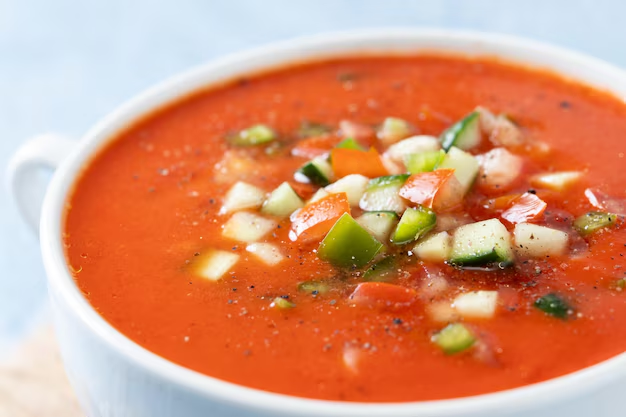How Long Does Homemade Vegetable Soup Stay Fresh in Your Fridge?
As the weather turns crisp, the allure of a warm, hearty bowl of vegetable soup becomes irresistible. Making a big batch at once doesn't only promise convenient meals throughout the week but also offers a way to make the most out of seasonal produce. However, just how long can you store that pot of goodness in your refrigerator? Understanding the shelf life of vegetable soup is vital not only for enjoying its flavors at their peak but also for safe consumption. In this guide, we'll explore everything you need to know about keeping your vegetable soup fresh and delicious for as long as possible.
🥦 The Basics of Soup Storage: How Long Is Enough?
Vegetable soup, like many homemade soups, typically lasts in the refrigerator for about 3 to 4 days. After this period, it's advisable to freeze it if you wish to extend its life further. The exact timeframe can vary depending on various factors including the storage conditions, ingredients used, and the initial freshness of those ingredients.
Factors Affecting Freshness
- Ingredients: Leafy greens, zucchini, and other quick-spoiling veggies can shorten the soup's shelf life.
- Storage Temperature: Ensure your refrigerator is consistently at or below 40°F (4°C) to slow bacterial growth.
- Storage Container: Airtight containers help retain flavor and prevent contamination, enhancing your soup's longevity.
- Initial Freshness: Fresher ingredients naturally extend the soup's freshness.
🥄 Best Practices for Storing Vegetable Soup
Keeping vegetable soup fresh begins with how it's stored. Here are some best practices for maximizing refrigerator life:
- Cool Before Storing: Let your soup cool to room temperature before refrigerating. This prevents raising the fridge's overall temperature, which can increase spoilage risks for other perishables.
- Use Proper Containers: Store your soup in airtight containers to prevent air exposure and contamination. Glass or high-quality BPA-free containers are ideal.
- Label Your Containers: For better management, include the preparation date on your containers to keep track of freshness.
🧅 Recognizing Spoiled Soup: Signs to Watch For
Even with optimal storage practices, it's important to recognize when soup has passed its prime. Knowing these signs can prevent potential health risks:
- Off Odor: A sour or unpleasant odor indicates bacterial activity.
- Unusual Texture: Look for changes like excessive coagulation or a slimy surface.
- Mold Growth: Visible mold spots are a clear sign of spoilage.
- Flavor Changes: A tangy or off-putting taste should not be ignored.
🍲 Freezing Vegetable Soup for Extended Shelf Life
Freezing is an excellent option for preserving vegetable soup beyond the fridge timeframe. Properly frozen vegetable soup can last for up to 4 to 6 months without significant loss of quality.
Tips for Freezing Soup
- Portion Wisely: Divide soup into meal-sized portions for easy thawing.
- Leave Space: Leave some space at the top of the container for the soup to expand as it freezes.
- Use Freezer Bags: Consider using heavy-duty freezer bags to save space. Lay them flat to freeze for stackable storage.
🥣 Reheating: Keeping Your Soup Delicious
Once stored or frozen, ensuring that your soup remains delicious upon reheating is key. Here’s how to do so effectively:
- Thawing: Always thaw frozen soup in the refrigerator overnight versus rapid thawing on the counter.
- Gentle Reheat: Reheat slowly on the stove, stirring occasionally to distribute heat evenly.
- Check Temperature: Ensure the soup reaches a simmer before serving to achieve a safe temperature for consumption.
👩🍳 Practical Tips for Making and Storing Vegetable Soup
To maximize both flavor and storage longevity right from the start, keep these practical tips in mind:
- Season After Reheating: Adding fresh herbs or salt after reheating can enhance flavors that might fade once stored.
- Batch Cook Vegetables: Cook fibrous vegetables longer initially; leafier greens can be added towards the end.
- Control Soup Thickness: Thick soups freeze better, while brothy soups might separate upon freezing and require stirring when reheated.
🌿 Vegetables and Their Specific Shelf Life in Soups
Understanding how different vegetables impact the soup’s lifespan is beneficial:
- Leafy Greens: Tend to spoil faster, often impacting soup within 2 to 3 days.
- Root Vegetables: Such as carrots and potatoes, maintain their quality longer.
- Tomatoes: Natural acidity can help preserve the soup, offering longevity to the dish.
📋 Quick Check: Your Soup's Freshness Timeline
For ease of reference, here’s a handy breakdown:
| Soup Storage Method | Shelf Life | Notes |
|---|---|---|
| Refrigerator | 3–4 days | Use airtight containers, label with date |
| Freezer | Up to 6 months | Portion out, use freezer-grade containers |
🍽️ Creative Uses for Leftover Vegetable Soup
Beyond reheating as is, leftover vegetable soup can be a versatile base for new culinary creations:
- Pasta Sauce: Thicken with tomato paste and herbs for a distinct sauce.
- Grain Bowls: Serve over rice or quinoa for a hearty meal.
- Savory Pies: Use as a filling for pot pies with added proteins or pastry.
🥕 In Conclusion
Navigating the delicate balance between freshness and flavor in vegetable soup storage is easier with the right knowledge and practices. Remember, keeping soups in the refrigerator for no more than 3 to 4 days and then considering freezing if needed, is the key takeaway. With these guidelines, you can enjoy the comforting flavors of vegetable soup safely and deliciously, meal after scrumptious meal. 🥳

